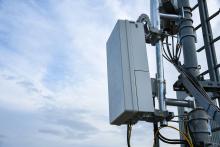In what can be mildly termed a significant 'variation' in the IEEE standards process,
27 companies including chipset vendors Atheros, Broadcom, Intel and Marvell
announced Monday the official formation of the Enhanced Wireless Consortium
(EWC) in an effort to speed up the IEEE 802.11n standards process. This
announcement comes only three months after these firms publicly committed to
developing a joint proposal to the IEEE task group.
The IEEE 802.11n task group has been mandated to create a wireless standard with
a throughput of at least 100 Mbps, which is at least three to four times the speed
of the current standards-based 802.11a and g. The foundation of the standard is
MIMO (multiple in, multiple out), technology created and developed by Airgo
Networks. Although the market leader in MIMO-based technologies--the company is
already in its third generation of hardware--Atheros and Ruckus Wireless (formerly
Video54), which have developed similar technologies, have challenged Airgo's
success.
Three significant proposals emerged from IEEE 802.11n meetings: MitMot
(Mitsubishi-Motorola), TGn Sync (Task Group 'n' synchronization) and WWiSE (World-
Wide Spectrum Efficiency). Influential industry players such as Atheros, Broadcom,
Intel, Motorola, Nokia, Nortel and Texas Instruments were split among these
proposals. Some argued for the use of beamforming, different types of preambles
and more or less spectrum, among myriad highly technical details. TGn Sync gained
majority support in a March 2005 meeting, but in May failed to gain the 75 percent
needed for the second confirmation vote. As part of the regular standards
process, the three proposal groups were then reinstated.
In July, the IEEE sanctioned a joint proposal group made up of the trio, whose goal
was to present a proposal at a November meeting in Vancouver. According to
published reports, it was later discovered that Broadcom and Intel, with Marvel and
Atheros joining sometime later, had secretly met outside the IEEE process to draft
their own proposal. This raised the ire of Airgo Networks, which desired full and
open participation in the standards process. Pundits and analysts commented that
this diversion would cost significant months in the selection and ratification of an
802.11n proposal.
The Enhanced Wireless Consortium (EWC) came out of the closet this week, with a
large group of promoter and adopter companies working together to "accelerate
the IEEE 802.11n development process and promote a technology specification for
interoperability of next-generation wireless local area networking (WLAN)
products." By bringing in additional companies, some that are not even involved in
the IEEE 802.11n standards process, this group is likely to deflate attacks over its
members' earlier extra-curricular activities and gain public support for the
proposal. The consortium specifically plans to submit a draft specification at the
November IEEE meeting, but the core specification is already complete.








